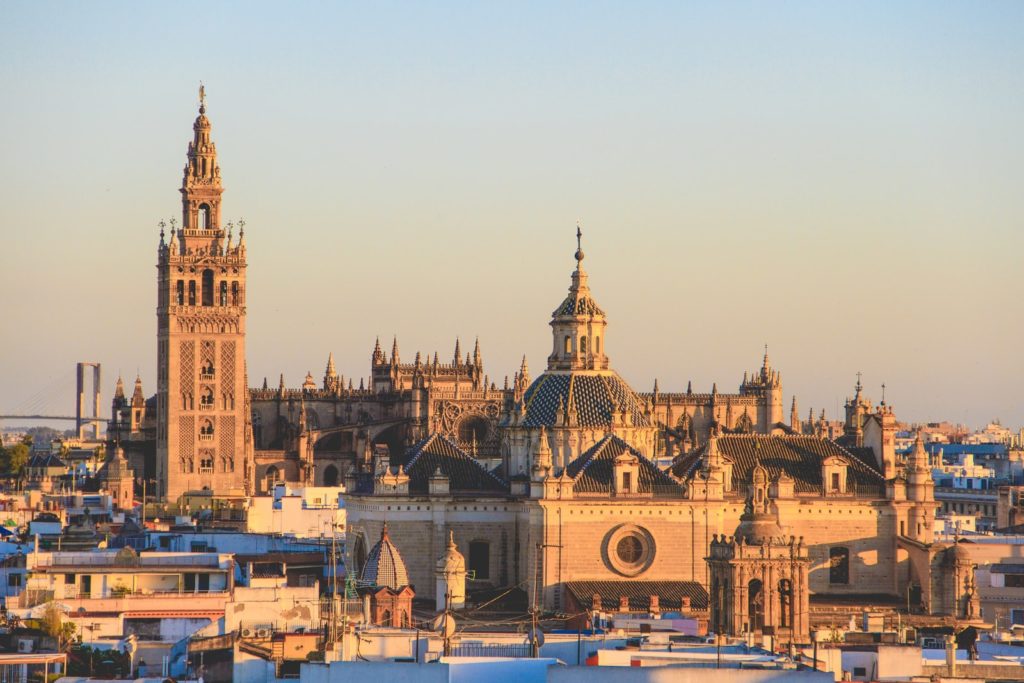Retiring in Spain: Things to Know
Spain is one of Europe’s most popular destinations for an exciting post-retirement relocation.
Warm, affordable, beautiful and modern, it has everything retirees need, with lots of alluring perks.
But if you want to know how to retire in Spain, it’s important you’re up-to-date with the latest knowledge and information… including facts and figures on pensions, visas, document requirements, and all the places you might want to consider living.
So in this guide, we’ve covered everything you need to know about how to retire in Spain. Bring your sunhat, hand in your resignation, and come join the swinging siesta!
Retirement in Spain for EU/EEA citizens
If you’re an EU/EEA national, and you want to know how to retire in Spain, here’s some good news for you: things are very easy.
As you probably already know, Spain is also an EU nation—which means that you need absolutely no visa or permit to retire in the nation (or even work or study there).
So before you relocate you don’t need to plan or apply for anything in advance: you simply pack your bags, arrive in the country, and you’ve successfully retired in Spain. Easy!
After three months, you’ll need to get your hands on a residence permit. But that’s all pretty simple and easy, and we’ve covered it in much more detail coming up soon.

Retirement in Spain for UK citizens after Brexit
Due to Brexit, UK citizens who want to retire in Spain now have the exact same rights as all other non-EU citizens who want to retire in Spain.
So for the steps you’ll need to take, UK citizens need to refer to the next part of this guide! We also have another great guide for those are looking up the specifics of moving to Spain post Brexit.
Retirement in Spain for Non-EU/EEA citizens
As a non-EU/non-EEA citizen who wants to retire in Spain, your most well-known option is the residence visa (which is also sometimes known as a ‘non-lucrative’ visa).
A standard relocation visa, it’s usually the most appealing option for anyone who wants to move to Spain long-term.
The residence visa entitles you to one year in Spain. When this year is over, you can apply for two seperate two-year extensions (giving you a total of five years in the nation). Beyond these five years, you can then apply for permanent residence in Spain. And if you’ve been a good boy and followed all the rules, you’ll very likely be granted it.
It’s important to note that this is a non-profit visa… so if you get bored of retirement life (though we’re not sure why you would), you’re not allowed to get a job to make any extra income.
If you obtain this type of visa, you need to stay in Spain for at least 183 days per year.
Another popular option is the so-called ‘golden visa,’ which is open to any non-EU/non-EEA resident who is willing to make a big fat contribution to the Spanish economy. Essentially, this is an investment visa—and if you successfully apply, you can live in Spain with very few rules or restrictions, and enjoy free movement throughout the EU.
The most common way of obtaining this golden visa is by investing €500,000 (or more) in some form of Spanish real estate. You can spend this money on one single property, or on a combination of various different properties. This investment is obviously a good idea if you plan to stay in Spain forever, as it entitles you to stay in Spain long-term, and gives you a long-term place to live!
Aside from buying real estate, you have several other investment options for obtaining this same visa (and all the same perks that come with it). You can:
- Buy €1 million (or more) shares in a Spanish company or fund
- Deposit €1 million (or more) in a Spanish bank
- Buy the equivalent of €2 million (or more) of Spanish government debt
- Start a “general interest” business in Spain, which will employ Spanish people

Required documents and processing fees for retiring in Spain
Coming up, much more detail on how to retire in Spain, depending on where you’re from…
Required documents and processing fees for EU citizens
Again, there’s very little bureaucracy required for EU citizens who want to retire in Spain.
As we’ve covered, you need absolutely nothing for your first 90 days. But around 3 months after you’ve arrived in Spain, you’ll need to register your residence in the nation.
To do so, you’ll typically need your passport, address (whether temporary or permanent), proof of health insurance, and proof that you have enough money to remain in the country. This application will give you access to a registration certificate, which officially confirms your right to live in Spain… forever!
This registration certificate typically costs between €9 and €12 euros. If you don’t get your hands on one, you may be fined (but you won’t be deported).
Required documents and processing fees for non-EU Citizens: residence visa
If you’re not from the EU and you’re working out how to retire in Spain, life is a little more complicated. So strap yourself in for some lengthy explanations!
If you want to move to Spain on the residence visa (again, that’s also known as the ‘non-lucrative’ visa), you’ll need to provide the following documents:
- Your passport (of course). It should have at least a year remaining
- Your application for the visa, which must be entirely and accurately completed
- Two passport-style photographs
- Proof of how much money you have, and how much regular income you’ll receive
- Proof of valid private medical insurance
- A medical certificate, stating any health problems you may have
- A clean criminal background, proven via a criminal record check
All of these documents must be properly and fully translated into Spanish by a professional translator.
You’ll need to provide all of these documents in your visa interview, which will take place in your home country.
The price of this visa application will vary depending upon where you’re from. It typically costs somewhere around €80, but this price hugely depends on your country of origin (residents of some nations, for example, need to pay upwards of €500).
On top of these fees, it’s also important to know that you’ll need to pay for some of your documents and checks—it’s estimated, for example, that a couple from the UK will pay a total of around €4,000 when they apply for this visa.
If your visa application is rejected, here’s some bad news: none of your fees will be refunded. So make sure you complete all documents properly, and don’t skimp on any details.
When you’ve submitted your application, you’ll usually find out whether or not you’ve been successful within 2 to 6 weeks. But if the embassy is busy, it might take up to 3 months.
An important note: if you’ve ever had a Schengen visa rejected, that might inhibit your ability to obtain a residence visa for Spain (but it’s not necessarily a deal breaker).
When you’re providing proof of your finances, you’ll need to demonstrate that you’ll be receiving at least €2,317 per month (or the annual equivalent). That’s the figure as of 2022, but you should of course check the specific rules for the specific time you’re applying—these numbers are of course dependent upon inflation and other factors.
If you’re moving to Spain with someone else, you’ll need to prove that you have an annual income of additional €6,949 per year (per person).
These sums of money of course don’t need to come from employment—they can instead come from your pension fund (which is obviously an important thing to know when you’re working out how to retire in Spain).
Required documents and processing fees for non-EU Citizens: golden visa
If you want to retire in Spain on the ‘golden visa,’ the documents you need are pretty much the same as the above—and, yes, you still need to provide proof of incoming funds, even though you’re investing in the Spanish economy.
But you’ll also need the documents pertaining to whatever investment you’ve decided to make as part of your application.
Importantly, you need to make your investment (no matter which type of investment you’re making) before you apply for your golden visa. That might seem like a big risk, but if you’ve already made the investment, and if you fulfill the requirements, there’s very little chance your application will be rejected.
When you get your golden visa, you’re entitled to stay in Spain for one year (if you applied outside of Spain), or two years (if you applied from within Spain). After that period is over, you can keep renewing your visa in 5-year increments.
A golden visa (unlike the typical residence visa) doesn’t require you to spend much time in Spain. As long as you visit the nation at least one time per year, your golden visa is valid. But if you want your golden visa to eventually lead to citizenship, you need to spend at least 183 days per year in the nation.
Again, it’s very important to note that you can only apply for a golden visa if you are from outside of the EU/EEA region.
Whichever visa you decide to use and apply for, things (as you’ve probably worked out by now) can be pretty complicated. But there are lots of lawyers and experts who can help you with your applications… so we recommend consulting one of them for help. They can make the whole process much more simple and stress-free.
That’s an especially good idea if you’re applying for the golden visa, since things are a little complex, and you’re investing a lot of money as part of your application. You want to make sure your money is safe, and hiring a lawyer is the best way to do that.
Retirement age in Spain
The retirement age in Spain currently sits at 65 years and 10 months… but over the next few years, it’ll gradually increase, until it’ll reach the age of 67 in 2027.
If a person has contributed to the Spanish social security system for 37 years or more, they’re allowed to instead retire slightly early… at the age of 65. But (because you’re reading this article!) that’s of course not going to apply to you.
Pensions in Spain
When you want to know how to retire in Spain, your pension plan is of course one of the most important considerations.
Because you’re not already a Spanish resident, and haven’t been contributing to the Spanish social security system, you’re not entitled to any Spanish pension plan.
That said, you will of course have access to your pension plan from your country of origin, which will provide the money you’ll be living off. And if you wish, you may be able to transfer your international pension plan to Spain…

Transferring your international pension plans to Spain
The implications of such a transfer massively depend upon where you’re from, and if your home country has some form of pension-related agreement with Spain.
If you’re from the UK, for example, you can take advantage of the QROPS (qualifying recognised overseas pension scheme). Under this scheme, you can combine different pensions into one pot, and avoid having to pay tax in two different places.
You should check if your home nation has any agreement in place with Spain—and take advantage of any agreement they have. It could potentially save you a lot of money and stress.
All of that said, you don’t necessarily need to transfer your pension plan to Spain—if you prefer to keep your pension plan in your home country, that’s completely possible.
In that case, you can simply get into the habit of transferring your money from your home bank account to your Spanish bank account, to avoid having to pay taxes or dealing with any other complications (though these regular bank transfers might incur some hefty fees, especially when added up over a long period of time).
It’s also important to note that if you transfer your international pension plan to Spain, you’ll perhaps need to pay tax on that pension. Which brings us to…
Taxes for retirees residing in Spain
If you transfer your pension to Spain, you’ll be taxed on any income you withdraw from that pension (unless, as we’ve mentioned, your nation has some form of agreement with the Spanish government).
It’s also important to note that Spain has types of tax which might not exist in your home country (including a so-called wealth tax).
You also need to declare any overseas assets exceeding €50,000, and you may need to pay capital gains tax if you sell any property (or other assets) in your home country.
Renting an apartment in Spain
When you’ve worked out how to retire in Spain, you of course then need to find a nice place to live.
Before you arrive in Spain, it can be difficult to know which city (or town) you want to live in, which part of that city (or town) you want to live in, and how to find a nice apartment or house in that place.
For those reasons, it’s usually best to find a short-term serviced apartment or rented apartment before you arrive in Spain. Homelike offers a lovely selection of apartments in various Spanish cities for different budgets and preferences. While you’re in that short-term apartment, you can check out various parts of Spain, decide where you want to live long-term, and find a good place to live long-term. We also offer a host of long term furnished rentals if you decide you’d rather find a furnished place than furnish a home from scratch.
The whole process of working out how to retire in Spain is already complex and stressful enough, so a simple short-term serviced apartment can take a massive load off your mind.
A good place to start (as always!) is Facebook, where you’ll find many real estate groups with properties in countless towns and cities.
Another good online portal is Idealista, which aggregates various properties from various real estate agents.
You’ll also find lots of property advertisements in Spanish newspapers (but that’s of course little use until you’ve actually arrived in Spain).
Your best option for finding a long-term rental property (as is also the case in most other nations) is to employ the help of real estate agents (or as they’re called in Spain, ‘inmobiliarias’).
Buying your own place in Spain
If you’re retiring on the golden visa, you might have already bought a place.
If you haven’t, buying property in Spain is still a very alluring idea… and it’s of course still possible. To do this, it’s best to get the guidance of an inmobiliaria, who can offer you lots of properties, talk you through every stage of the process, and help you to find a lawyer with relevant expertise.
The good news is that Spanish property is pretty cheap compared to property in many other parts of western Europe. The price per square meter to buy a city-center apartment in Madrid is around €5,077. In Paris, it’s €12,066. In London, it’s a massive €15,667.
And of course, if you move outside of Madrid, the prices are even lower—so buying property in Spain can be a very affordable choice. Perfect if you want to retire in a nice place without splashing too much cash!
Healthcare options in Spain
For anyone considering how to retire in Spain, healthcare is massively important.
Whatever visa you get, you need to have (and provide proof of) some private medical insurance. Because you have this insurance, you’re able to access private medical healthcare—and therefore won’t need to access the Spanish public healthcare system.
If you’re from another EU/EEA country and you’re of retirement age, you’re entitled to free public healthcare in Spain.
Best places to retire in Spain
Alright, we’ve covered how to retire in Spain… now you need to know where to retire in Spain!
There are (of course!) lots of varied places to choose from, but some of the most popular include:
- Madrid: Spain’s capital and biggest city, Madrid is usually the first consideration for city-loving cosmopolites. More than a million foreign residents live in Madrid, making it an easy and popular choice for relocation (no matter how old you are!).
- Barcelona: The nation’s second-biggest city is brimming with art, culture, and endless places to eat and drink. If you like a fast pace of life, or want to live in a city close to beaches, it’s a great choice.
- Malaga: Right in the south of Spain, this is one of the most popular picks for year-round good weather, with mild winters and super-hot summers. A relatively peaceful city, it offers great seafood, and lots of hiking, beaches, watersports and golf.
- Alicante: Sitting between Malaga and Barcelona is Alicante, one of the most popular tourist destinations in Spain. As a tourist hotspot, it’s also hugely popular with retirees, hosting a massive percentage of non-nationals. In total, around 340,000 people live here.
- Seville: Seville is another good choice for year-round warm weather. Super charming, this is southern Spain summed up perfectly, with Moorish architecture, a laid-back life, a nice balance of locals and expats, and the tastiest tapas you’ve probably ever eaten.
- Valencia: The third-biggest city in Spain, Valencia is a good option if you want to live in a large city that feels a little more ‘authentic’ than Madrid and Barcelona. Way fewer foreigners live here, and you get great beaches and relatively low prices.
- San Sebastian: Right on the northern coast, the resort city of San Sebastian is one of the most popular tourist spots in the nation. The beaches, the city and the hills are all super beautiful, and the place has a population of less than 200,000.
Again, if you want to check out any of those places for yourself before you commit to living there long-term, we offer lots of serviced apartments and rented apartments in each location.
And for even more ideas on all the towns and cities where you might want to retire in Spain (there are way more than just the above!), check out all of the options on our site.
Thanks for reading, and thanks for checking out Homelike. See you next time!






















